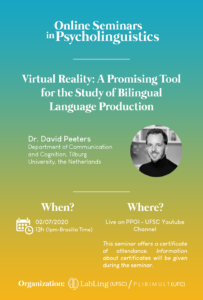Online Seminars in Psycholinguistics/Seminários Online em Psicolinguística (Dia 01)
Data da publicação: 24 de junho de 2020 Categoria: Eventos, Eventos, NotíciasOnline Seminars in Psycholinguistics/Seminários Online em Psicolinguística
O Laboratório da Linguagem e Processos Cognitivos (LabLing/UFSC) e o Grupo de Pesquisa em Processamento da Linguagem de Bilíngues e Multilíngues (Plibimult/UFC) convidam a todos para os Seminários Online em Psicolinguística, uma série de videconferências sobre temas relacionados à aprendizagem e processamento da linguagem.
A primeira videoconferência da série será apresentada pelo Prof. Dr. David Peeters, da Universidade de Tilburg (Holanda), no dia 02/07/2020, às 13h (horário de Brasília). A palestra será transmitida pelo canal do PPGI-UFSC no Youtube. Os participantes poderão fazer perguntas e comentários pelo chat. Haverá certificado de participação e as informações sobre certificação serão fornecidas durante a videoconferência.
Virtual Reality: A Promising Tool for the Study of Bilingual Language Production
Dr. David Peeters, Department of Communication and Cognition, Tilburg University, the Netherlands
02/07/2020 – 13h (Horário de Brasília)
Live no canal do PPGI-UFSC no Youtube: https://www.youtube.com/watch?v=fZXXIcE_84o&t=300s
Virtual Reality (VR) technology is increasingly used as a tool for psychological research. In the language sciences, however, its use has long remained virtually non-existent. In this talk, I will argue that immersive VR technology offers unique possibilities to answer fundamental questions about the neurocognitive mechanisms supporting human language and communication. More than other methods, it combines ecological validity, experimental control, and repeatability in experimental settings. Moreover, as a mode of display, it can relatively easily be combined with the collection of EEG, eye tracking, and motion capture data to track online linguistic and communicative processes. I will discuss ongoing work from our lab that shows the added value of VR in the study of bilingualism, specifically focusing on the mechanisms that allow bilinguals to switch between languages and listeners when producing speech.
Bio
Dr. David Peeters is an assistant professor in the department of Communication and Cognition at Tilburg University, the Netherlands. In his work, he makes use of immersive virtual reality (VR) technologies to study human linguistic and communicative capacities in rich and dynamic audiovisual contexts. Specifically, he applies VR in combination with motion tracking, eye tracking, and electroencephalography (EEG) to learn more about the cognitive and neural underpinnings of language and communication in domains such as neuropragmatics, multimodal and non-verbal communication, and multilingualism. He did his doctoral research at the Max Planck Institute for Psycholinguistics and is currently funded by a Veni grant from the Dutch Research Council (NWO).


